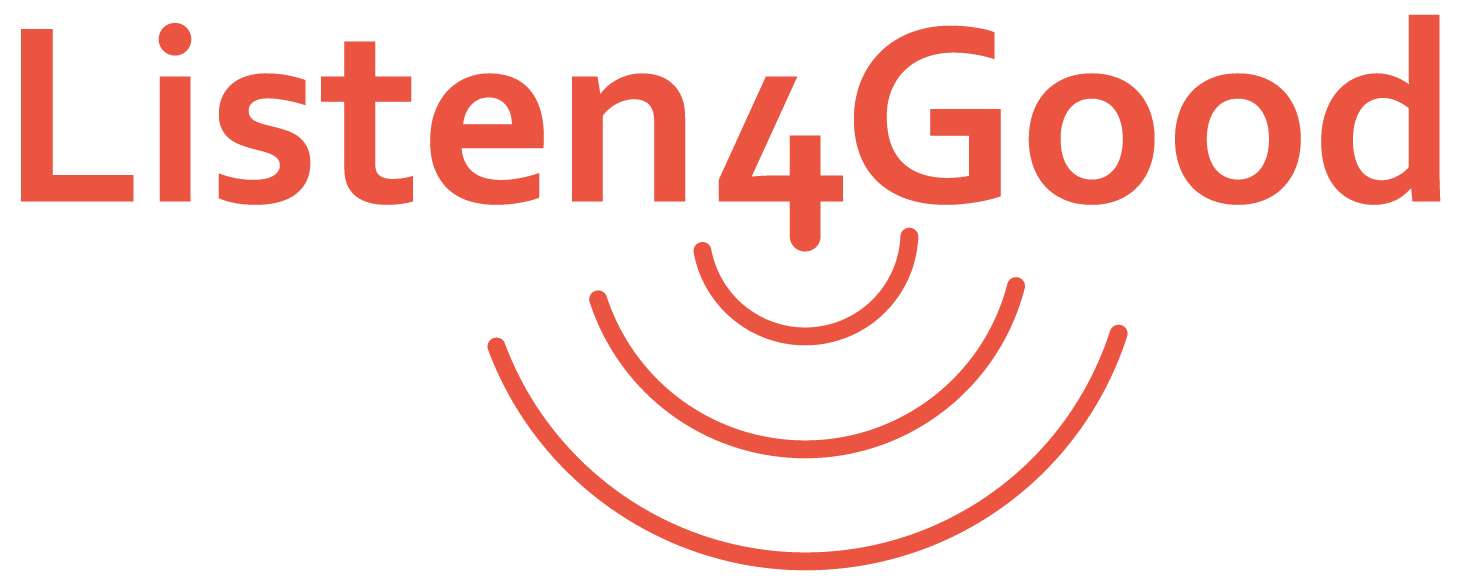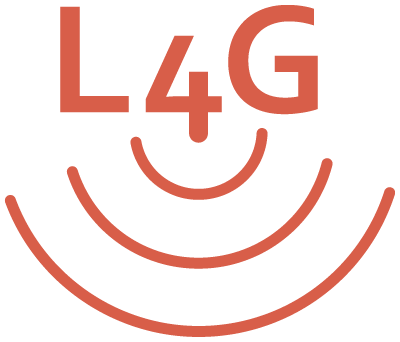Listen4Good Equity Statement
In 2023, the Listen4Good (L4G) team worked collaboratively with consultant, Tania Clerisme, to draft the following equity statement and commitments to specific practices. The work is rich and challenging to capture in a brief website format. We provide it in full below.
Through our partnerships with service organizations, our work at Listen4Good (L4G) reaches and uplifts communities that have been historically restricted from power. We recognize there are not only inherent power imbalances between funders and service organizations, but also between these organizations and the individuals they serve. We acknowledge that our work is not free from these systems that perpetuate inequality. We also acknowledge that the most deep-seated, systemic, and enduring inequities in our country exist across lines of race and that race continues to determine individuals’ outcomes.
In light of this context, we seek to uplift voices that have been systematically marginalized and strengthen organizational systems to redistribute power. We define power as the opportunity to influence processes and institutions, including the ability to make decisions that shape the circumstances of both one’s own and others’ lives and environment. We seek to evolve how power is distributed, both within our own organization and those we work with, sharing it outside of the most “traditional” centers of authority to engage individuals who may have historically been denied power.
With this conviction, we put race at the center of our equity work. Using a racial equity lens means that we examine potential impacts, both intended and unintended, for BIPOC (Black, Indigenous, people of color) individuals, and take actions that tend to BIPOC constituents’ needs. We build upon our racial equity lens with an intersectional perspective that acknowledges the interconnected nature of race and other aspects of identity, because power operates with a disproportionate impact at the intersection of these identities. As such, our commitment to equity seeks to be thoughtful and intentional about multiple aspects of diversity. This commitment grounds our mission of helping organizations embed a culture of high-quality feedback, which must acknowledge and confront power imbalances.
We are working toward the following practices, with the intention to incorporate regular moments of reflection to hold ourselves accountable to our commitment:
Internal Practices
Increased Team Diversity: We prioritize racial diversity in hiring and examine our recruitment and hiring practices for bias. We commit to an organizational ladder that transparently outlines the requirements for advancement and pay progression and work to establish strong pipelines of BIPOC staff. We aim for more representation of BIPOC leaders in management and advisory positions.
Shared Power: Our team shares power in our work, our processes, and when making decisions for the organization. We seek diverse participation and input from our colleagues, being sure to amplify the voices of BIPOC staff. We also seek input from the organizations we serve, through regular feedback mechanisms and diverse advisory boards composed of organizations participating in our programs. We seek collaboration between staff at all levels when making decisions, ensuring that our organizational decision-making systems not only welcome and include BIPOC staff, but also prioritize the impact of decisions on BIPOC staff.
Inclusive Culture: To continually strengthen our culture of belonging, we engage in ongoing discussions about how our backgrounds shape our values and interactions within the team and regularly assess team perceptions of our culture. We prioritize the needs of BIPOC staff, challenge white supremacy norms, and deeply consider a sense of belonging for all members.
Structures for Performance Management and Development: We are committed to a holistic view of performance management and advancement that fosters individual growth and supports individual identity. We allocate dedicated time and resources to further the professional growth of our team, including but not limited to equity development work. We integrate racial equity training and skill building into our internal work as a collective focus rather than assigning it as an additional responsibility.
External Practices
Who We Serve
We work with a wide range of organizations committed to elevating the voices of those least heard. We intentionally seek to provide our resources to:
- BIPOC-led organizations
- BIPOC-serving organizations
- Organizations which have historically had less access to funding
We seek out inclusive partnerships in a thoughtful and culturally competent way to provide funding for diverse communities to access high-quality capacity-building programming. We secure funding to provide our programs at an accessible price for organizations who have historically been excluded from funding.
How We Partner
In acknowledgment of the power dynamics within the nonprofit and philanthropic sectors, L4G thoughtfully balances our partnership with organizations participating in our capacity-building programs and with the organizations that fund them. We do this with humility, leveraging the following tenets:
Thought partnership: We serve as thought partners with participating organizations to share expertise, brainstorm options, and highlight tradeoffs in how participants can embed high-quality feedback practices.
Prioritizing trust and learning: We champion the participant’s expertise with confidence that they know their communities, needs, and context best. As such, we build trusting relationships with our participants that allow them to be vulnerable and focus on continuous improvement. We utilize a coaching model, rather than a consulting model, recognizing the expertise and skill of participants and supporting them as the ultimate decision-makers.
Funding dynamics: We aim to create an environment where participants can focus on feedback without worrying about the impact of funding dynamics. As such, we prioritize protecting organizations’ trust and their clients’ confidentiality above funders’ needs. Towards that end, we commit to being transparent about what data we share with whom.
Our Programming
Equity-centered feedback practices: L4G supports organizations to embed feedback practices that operate in service of equity by including client voices as a routine component of operational and decision-making structures, as represented in our client engagement pyramid. We work with organizations to intentionally challenge where power and privilege exist, how decisions are made and communicated, and how that impacts people’s daily lives.
Prioritizing voices least heard: We encourage organizations to center racial equity by segmenting data and prioritizing actions based on feedback from BIPOC clients. Similarly, we segment the data we collect about organizations’ progress and feedback to ensure our programs are meeting the needs of BIPOC-led organizations. We acknowledge that clients’ racial identities intersect with other identities, and we guide organizations to consider the impacts of those intersections in their survey design, administration, analysis, and action planning.
Culturally competent coaching: We seek racial diversity and cultural competency across our coaching team, and we consider each coach’s expertise, identities, and lived experience in matching them with organizations. Our coaches bring L4G’s systematic and proven approach to building organizational capacity for client feedback, while recognizing that all organizations are unique and working with each organization to adapt our program to their specific context.
Accessibility, inclusivity, and representation: We seek to ensure that information is clear, and easy to find and navigate. We seek to incorporate digital and language accessibility in our tools and resources, considering the needs of people with disabilities, varying literacy levels, and/or for whom English is not their primary language. In addition, we ensure representation of the diverse spectrum of organizations with which we work in our examples and case studies.

